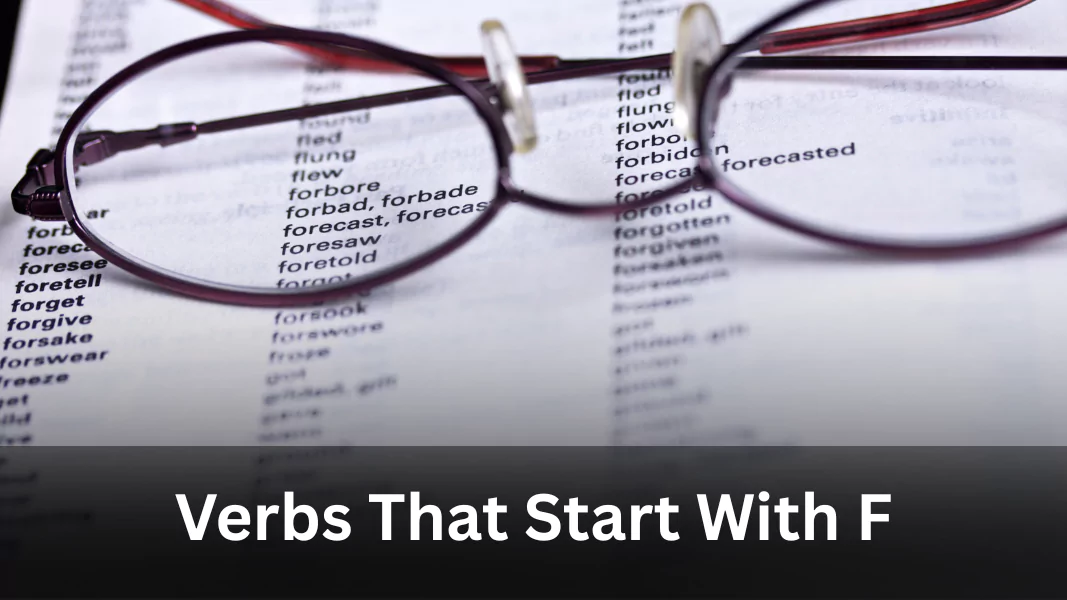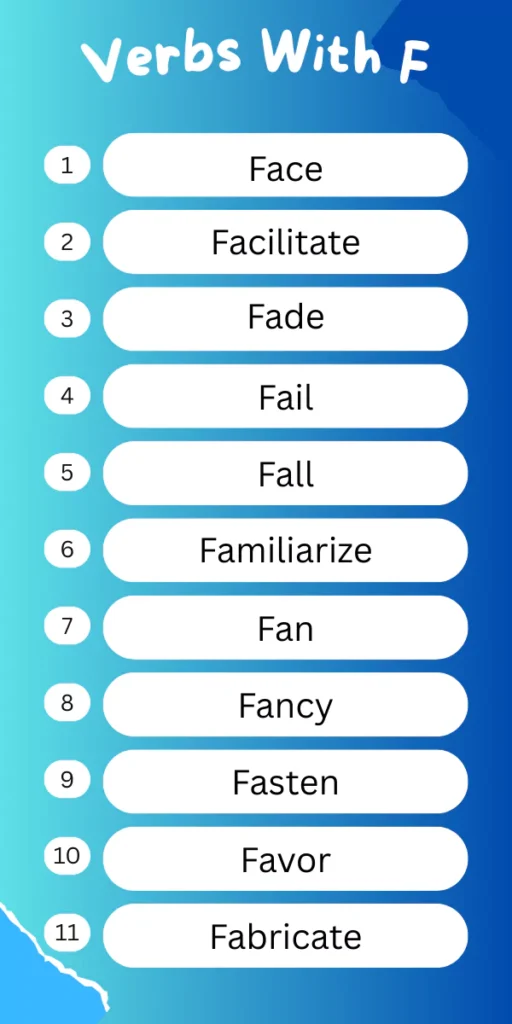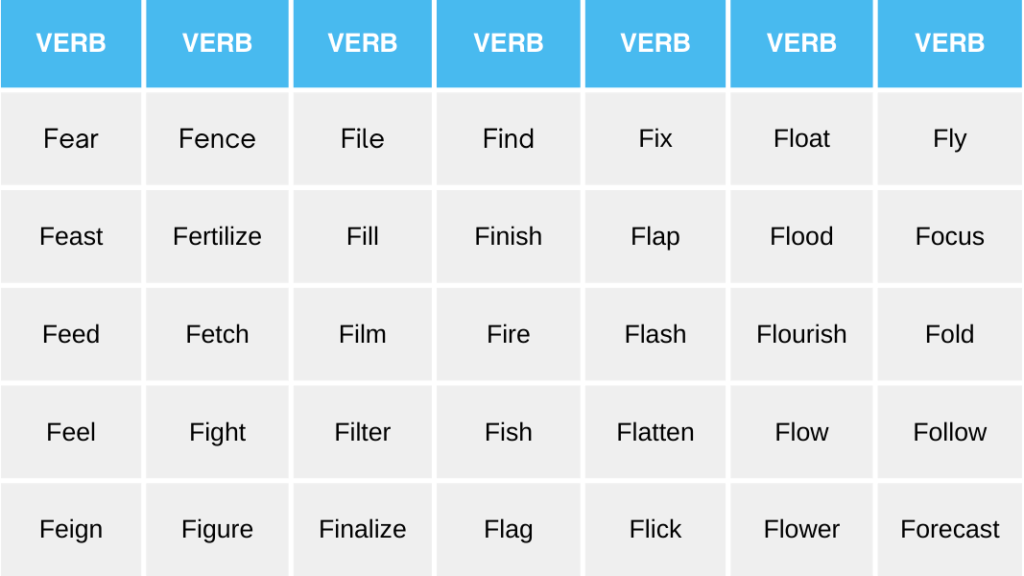Verbs That Start With F – Full List of Common, Positive & Rare Verbs

When it comes to verbs that start with the letter F, most of us instantly think of familiar choices like fall, find, or fly. Yet, the letter F introduces a much broader world of action words like powerful, positive, and versatile verbs that enrich both our speech and writing. From everyday essentials like feel and follow to uplifting words like flourish and foster, F-verbs carry force, flair, and flexibility. Whether you’re a student building vocabulary, a writer seeking the perfect word, or simply someone who enjoys sharpening language skills, exploring verbs beginning with F will open the door to more expressive and impactful communication.
List of Verbs That Start With F
Verbs that start with the letter F bring both strength and flexibility to the English language. They can describe physical actions, like fall, fly, or fight, as well as more abstract concepts, such as foster, focus, or forgive. These words are highly versatile and useful in everyday communication, academic writing, creative projects, and professional contexts.
In this section, you’ll find a complete collection of verbs starting with F, ranging from the most common to more unique and expressive options. Whether you’re looking to enrich your vocabulary, improve your writing style, or simply discover new words, this list will serve as a helpful reference and inspiration.

Common Verbs Starting With F
| Verb | Meaning | Example |
|---|---|---|
| Fall | to drop down from a higher place | Leaves fall from the trees in autumn. |
| Find | to discover something | I need to find my keys. |
| Feel | to experience an emotion or sensation | I feel happy today. |
| Fight | to engage in conflict or struggle | They fight for their rights. |
| Fly | to move through the air | Birds fly across the sky. |
| Follow | to go after or come behind | Please follow the instructions. |
| Feed | to give food to | She feeds the baby every 3 hours. |
| Face | to confront or deal with | We must face our fears. |
| Fix | to repair something | He fixed the broken chair. |
| Focus | to direct attention on something | Focus on your studies. |
| Finish | to complete something | I finished my homework. |
| Forget | to fail to remember | Don’t forget to call me. |
| Forgive | to stop feeling angry at someone | She forgave her friend after the argument. |
| Force | to make someone do something | The wind forced the door open. |
| Fetch | to go and bring back something | The dog fetched the ball. |
Positive Verbs Starting With F
- Flourish – to grow or develop well.
Example: Her business flourished after the new strategy. - Fulfill – to achieve or satisfy something.
Example: He fulfilled his dream of becoming a doctor. - Foster – to encourage growth or development.
Example: Teachers foster creativity in students. - Free – to release or set free.
Example: They freed the bird from the cage. - Forgive – to let go of anger.
Example: He forgave his brother for the mistake. - Facilitate – to make something easier.
Example: The guide facilitated communication between groups. - Frame – to create or build.
Example: He framed his achievements in a positive light. - Fuel – to energize or stimulate.
Example: Her passion fueled her success. - Fascinate – to attract and hold attention.
Example: Space fascinates many children. - Friend – to befriend or make friends with.
Example: She friended her new classmate on social media. - Favor – to support or show kindness.
Example: The teacher favored hardworking students. - Fancy – to like or be attracted to something.
Example: She fancies a cup of tea. - Fortify – to strengthen.
Example: Vitamins fortify the immune system. - Forecast – to predict positively.
Example: They forecasted good weather for tomorrow. - Frame – to design positively.
Example: He framed his ideas carefully for presentation.
Action Verbs Starting With F
| Verb | Meaning | Example |
|---|---|---|
| Fight | to engage in combat | The soldiers fought bravely. |
| Flee | to run away quickly | The thief fled the scene. |
| Flip | to turn something over quickly | She flipped the pancake. |
| Flick | to move with a quick motion | He flicked the switch on. |
| Float | to rest or move on water | The boat floated on the river. |
| Fly | to move in the air | The plane flies across continents. |
| Fold | to bend or lay something over itself | She folded the clothes neatly. |
| Fit | to be the right size | The shoes fit perfectly. |
| Fish | to catch fish | They went fishing in the lake. |
| Fetch | to bring something back | The child fetched water from the well. |
| Fry | to cook in oil | She fried eggs for breakfast. |
| Fill | to make full | He filled the glass with water. |
| Face | to deal with directly | We must face the problem together. |
| Flash | to shine brightly for a short time | Lightning flashed across the sky. |
| Flow | to move like liquid | The river flows gently to the sea. |
Regular Verbs That Start With F
- Face → Faced – to confront.
Example: She faced her fears. - Fail → Failed – to not succeed.
Example: He failed the test. - Fetch → Fetched – to bring back.
Example: The boy fetched his mother a glass of water. - Fix → Fixed – to repair.
Example: They fixed the broken car. - Fold → Folded – to bend neatly.
Example: She folded the napkins. - Form → Formed – to create.
Example: They formed a new club. - Fry → Fried – to cook in oil.
Example: He fried the potatoes. - Film → Filmed – to record.
Example: They filmed the wedding. - Farm → Farmed – to cultivate land.
Example: They farmed the land for years. - Finish → Finished – to complete.
Example: She finished her assignment early. - Flood → Flooded – to overflow.
Example: Heavy rains flooded the streets. - Formulate → Formulated – to plan or invent.
Example: The scientist formulated a new theory. - Furnish → Furnished – to supply furniture.
Example: They furnished the new apartment. - Forecast → Forecasted – to predict.
Example: The weather was forecasted as sunny. - Foster → Fostered – to encourage growth.
Example: She fostered kindness in her children.
Irregular Verbs Starting With F
- Fall → Fell → Fallen – to drop downward.
Example: The glass fell off the table. - Feed → Fed → Fed – to give food.
Example: She fed the kitten. - Feel → Felt → Felt – to sense or experience.
Example: I felt cold last night. - Fight → Fought → Fought – to struggle or battle.
Example: They fought bravely in the war. - Find → Found → Found – to discover.
Example: He found a coin on the ground. - Flee → Fled → Fled – to escape quickly.
Example: The criminals fled the scene. - Fling → Flung → Flung – to throw with force.
Example: She flung her bag on the sofa. - Fly → Flew → Flown – to move in the air.
Example: The bird flew away. - Forbid → Forbade → Forbidden – to prohibit.
Example: Smoking is forbidden here. - Forecast → Forecast → Forecast – to predict.
Example: They forecast heavy rain. - Foresee → Foresaw → Foreseen – to anticipate.
Example: She foresaw the challenges ahead. - Forego → Forewent → Foregone – to give up or do without.
Example: He forewent dessert to stay healthy. - Freeze → Froze → Frozen – to turn to ice.
Example: The lake froze in winter. - Forgive → Forgave → Forgiven – to pardon.
Example: She forgave her friend. - Forsake → Forsook → Forsaken – to abandon.
Example: He forsook his old habits.
Phrasal Verbs Starting With F
| Verb | Meaning | Example |
|---|---|---|
| Fall apart | to break into pieces | The chair fell apart after years of use. |
| Fall behind | to lag or not keep up | She fell behind in her studies. |
| Fall for | to be deceived by or to fall in love | He fell for her smile instantly. |
| Fall out | to argue and end a friendship | They fell out over money issues. |
| Fall through | to fail or not happen | The deal fell through at the last minute. |
| Figure out | to solve or understand | I can’t figure out this puzzle. |
| Fill in | to complete or substitute | Please fill in the form. |
| Fill up | to make full | He filled up the tank with gas. |
| Follow up | to pursue or check later | She followed up on her job application. |
| Freak out | to panic or get upset | He freaked out when he saw the spider. |
| Face up to | to accept reality | You must face up to your mistakes. |
| Fade away | to disappear gradually | The sound faded away in the distance. |
| Fish for | to try subtly to get information | He was fishing for compliments. |
| Flash back | to suddenly remember | He flashed back to his childhood memories. |
| Fob off | to trick or deceive with excuses | The shopkeeper fobbed me off with a fake product. |
Rare and Unique Verbs Starting With F
- Fangle – to fashion or invent fancifully.
Example: He fangled a new tool for the garden. - Fard – to apply makeup.
Example: She farded her face before the event. - Famble – to stammer or stutter.
Example: He fambled during the speech. - Fettle – to repair or put in good order.
Example: The mechanic fettled the old bike. - Fledge – to develop feathers and learn to fly.
Example: The young birds fledged in spring. - Flummox – to bewilder or confuse.
Example: The hard riddle flummoxed the students. - Flichter – to flutter lightly.
Example: Butterflies flichtered around the garden. - Foin – to thrust with a weapon.
Example: The knight foins at his opponent. - Flense – to strip blubber from a whale.
Example: Workers flensed the whale quickly. - Fremble – to tremble or shake.
Example: He frembled with fear. - Furbish – to polish or renovate.
Example: They furbished the old house beautifully. - Fleer – to laugh mockingly.
Example: The bully fleered at his classmate. - Fay – to join closely or fit together.
Example: The carpenter fayed the wooden pieces. - Funk – to avoid out of fear.
Example: He funked the challenge at the last minute. - Fadge – to suit or succeed.
Example: His plan didn’t fadge as expected.
Popular & Impactful Verbs That Start With F
| Verb | Meaning | Example |
|---|---|---|
| Focus | to concentrate attention | Students must focus on learning. |
| Frame | to structure or present ideas | He framed his thoughts clearly. |
| Fuel | to energize or power something | Passion fuels creativity. |
| Flourish | to grow or succeed greatly | His career flourished in New York. |
| Forge | to build or create strongly | They forged a strong friendship. |
| Foster | to encourage growth | The program fosters innovation. |
| Facilitate | to make easier | The app facilitates communication. |
| Forecast | to predict the future | Economists forecast steady growth. |
| Fortify | to strengthen or support | Vitamins fortify the body. |
| Feature | to highlight or include | The film features top actors. |
| Follow | to pursue or act upon | Always follow your dreams. |
| Frame | to design or outline | He framed a new policy. |
| Fuse | to blend or combine | The chef fused two cuisines. |
| Filter | to refine or separate | They filtered the water before drinking. |
| Fight | to stand up and resist strongly | They fight for justice and equality. |

Fun Facts About Words Beginning With F
- F is One of the “Strongest” Sounding Letters – Linguists note that the “f” sound is a fricative, created by forcing air between the lips and teeth. This makes many F-words (like fight, force, fast) sound powerful and energetic, giving them a sense of action and strength.
- The Word “Fun” is the Oldest Positive F-Word -The word fun first appeared in the late 17th century, originally meaning cheat or trick. Over time, its meaning completely flipped to something cheerful and enjoyable making it one of the most positive F-words today.
- F-Words Can Be Intensifiers – In English slang and idioms, many F-words act as intensifiers. For example, fantastic, fabulous, and fierce exaggerate positivity, while others like fearsome intensify the negative. This versatility makes F-words especially impactful.
- Double F Endings are Common in Old English – Words like cliff, sniff, snuff, and puff show how Old English favored -ff endings to signal a sharp stop sound. Many modern F-words still preserve this quirky spelling pattern.
- The Letter F Shaped Our Vocabulary of Emotion – Many emotional verbs begin with F like fear, forgive, forget, fancy, favor, fret. This gives F a special role in English, helping us describe both our deepest feelings and everyday moods.
Read: Verbs That Start With E
FAQs
Conclusion
Verbs beginning with the letter F are far more than just everyday action words like fall or fly. They are versatile, powerful, and expressive, covering everything from common daily activities to rare, unique terms that enrich your vocabulary. Whether you’re a student, a writer, or simply a word enthusiast, exploring F-verbs can help you communicate with precision, positivity, and creativity. From uplifting words like flourish and foster to impactful verbs like focus and formulate, F-verbs bring energy, strength, and flair to the English language. So the next time you want to add variety and impact to your speech or writing, let the forceful letter F lead the way.
